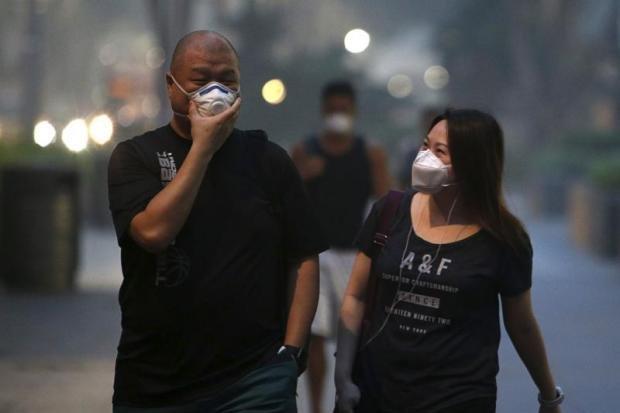
Singaporeans brave the haze on Orchard Road. The country's three-hour haze Pollutant Standards Index reached a high of 341 on Friday. (Reuters photo)
Recently, large parts of Songkhla, Trang and Phuket were blanketed by haze from forest and plantation fires in Indonesia's Sumatra and Kalimantan. At one point, the particulate matter in the air in Hat Yai township hit 123 microgrammes/cubic metre -- a level considered unsafe to residents' health. Officials in the affected area distributed face masks to people who were also advised to avoid outdoor activities.
The haze problem in the three southern provinces was temporary and did not create a major problem. However, it is a completely different story in Singapore where tempers are high and patience has run out as the haze problem has persisted for almost a month now with little signs of abating.
Singapore, which is located close to Sumatra, has every reason to feel angry with its neighbour. Last Friday, the Pollutants Standard Index reached 341 -- the highest level this year, prompting authorities to shut down schools.
But what appeared to have fuelled the fire of discontent was evident in a message on Singapore Foreign Minister K Shanmugam's Facebook page: "We are hearing some shocking statements made, at senior levels, from Indonesia. How it is possible for senior people in government to issue such statements, without any regard for their people, or ours, and without any embarrassment, or sense of responsibility?"
Without naming names, Mr Shanmugam was obviously referring to Indonesia's vice-president Jusuf Kalla who was quoted to have said recently that the country's neighbours should be grateful for the fresh air from Indonesia's general environment and its forests when there are no fires for the other 11 months of the year. Moreover, Indonesia has rejected Singapore's offer to help in extinguishing fires in Sumatra and Kalimantan.
Singapore's frustration and anger are understandable. If we in Thailand, especially southern Thailand, faced the same problem as Singaporeans do -- having to wear face masks whenever we go outdoors because of the risk to our health and deprived of the joy of living a normal life and seeing a clear blue sky -- then we would react in the same fashion.
The Indonesian government has sent about 3,000 troops to fight hundreds of fires in Sumatra and Kalimantan. A state of emergency has also been declared in Riau province where the pollutant index exceeds 900, which is regarded as an extreme health hazard and has forced many residents to flee to Medan and Padang in Sumatra.
Indonesia has announced the arrest of several executives of seven companies accused of causing the fires through illegal slash-and-burn practices. Indonesian President Joko Widodo has also vowed to hold disobedient plantation companies responsible and has threatened to revoke their licences. But action speaks louder than words as environmentalists say they have heard such promises before.
It all sounds so familiar here where successive governments have cultivated cozy relationships with big corporations and where environmental issues are often sacrificed on the altar of economic development.
The Singapore government has served legal notices on five Indonesian companies accused of causing the fires. They include the multinational Asia Pulp and Paper which is one of the world's largest pulp and paper groups, Rimba Hutani Mas, Sebangun Bumi Andalas Wood Industries, Bumi Sriwijaya Sentosa and Wachyuni Mandira.
Under the Transboundary Haze Pollution Act, Singapore can impose a fine of up to S$100,000 (2.5 million baht) a day on the companies for contributing to unhealthy levels of haze in Singapore.
But the court action alone will not stop the haze problem or the fires caused by small-scale planters and plantation owners in Indonesia through their slash-and-burn practices. First of all, Indonesia must demonstrate strong and genuine conviction to deal with the problem which is still lacking, as evident in the annual recurrence of the haze problem which seems to get worse each year.
More importantly, the greediness of the big plantation owners and the intransigence of the companies as they push for more expansion needs to be reined in. In other words, if these people still can flaunt the law with impunity, and if the officials concerned continue to look the other way, the problem can never be solved.
This will continue to have an impact on Indonesia's relations with its neighbours, Singapore in particular. It should be treated as an Asean problem, not just a bilateral one.
Veera Prateepchaikul is a former editor, Bangkok Post.
Source: Jakarta must show conviction over haze problem
No comments:
Post a Comment